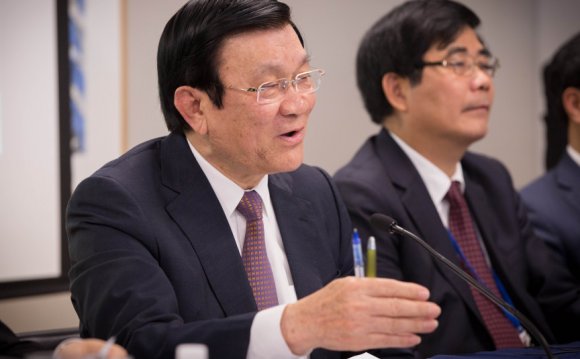
 It's 8am in Hanoi and already countless motorbikes, mopeds and scooters movement through the roads. Some sway with the body weight of 2 or 3 individuals, bins of product, sacks of rice, or tied-down pieces of furniture appear thicker than car and motorist combined.
It's 8am in Hanoi and already countless motorbikes, mopeds and scooters movement through the roads. Some sway with the body weight of 2 or 3 individuals, bins of product, sacks of rice, or tied-down pieces of furniture appear thicker than car and motorist combined.
When it comes to first-time pedestrian, crossing the street is a daunting experience, but, amid all the apparent chaos, the "system" works. The trick is only stroll when it's possible to, and allow the torrent of bicycles stream around you. Do not look kept, never look appropriate. Only stroll.
This performance chaos contrasts sharply with the mostly sensible macroeconomic program that Vietnam has been using. The Doi Moi, or "renovation" financial reforms were launched in 1986, emulating Asia's relocate to start its areas, after significantly more than ten years of stagnation because the fall of Saigon into the Vietnamese communist forces.
Vietnam changed rapidly in the past a decade, but locals state the country still lags behind its neighbors, including Thailand and Malaysia, which have a gross national earnings (GNI) per capita of $3, 760 and $7, 230 correspondingly. A year ago, Vietnam's GNI per head was US$1, 010, highlighting the united states's impressive progress on eradicating extreme poverty. Hanoi is a country mile off through the peaceful, inward-looking town it absolutely was before Vietnam's financial take-off, though rural poverty continues, particularly in even more remote and ethnic minority areas.
How-to keep this progress is the key challenge dealing with Vietnam's plan makers. Thailand and Malaysia tend to be hemmed in because of the alleged "middle-income trap", which suggests that while countries can move up from ranks of the very poor, moving more ahead is more complex, as competition falls down and costs for people increase. Aided by the middle-income pitfall comes widening inequalities, as vast wealth usually gets concentrated in some hands.
Kuala Lumpur in 2010 launched bold plans to transform Malaysia into an OECD-standard economy, attempting to imitate the rise of Southern Korea, as soon as the poorest nations in the world. Imperative to South Korea's rise was knowledge reform, which is one location in which Vietnam does really. In Hanoi, conversations with younger Vietnamese specialists and students had been all peppered with references towards the need for education to Vietnamese folks. Investments in eduation and wellness were part of Vietnam's renovation reforms.
Vietnam recently been promoted for this center division associated with international financial league tables, but really wants to excersice up the ranks. In accordance with most of Asia, Vietnam's economy is vaulting clear of the global slowdown – that hindsight now looks similar to a western malaise. Growth for 2010 is projected to conquer the 5per cent recorded this past year – though these figures are upon the 6.5% -8% average the past decade.
The opening, in October, of technology firm Intel's largest plant on earth, in Ho Chi Minh City, was a high-profile reminder of the nation's introduction as a good investment target for multinationals. Intel president and leader Paul Otellini joined Vietnam's deputy prime minister, Hoang Trung Hai, within orifice, with Hai remarking the brand new facility "supports our aim of accelerating economic change led by technology-intensive industries". Under seven days later on, in the culmination regarding the eastern Asian and ASEAN summits, held in Vietnam, US secretary of state, Hillary Clinton, observed the signing of financial investment deals by Microsoft and Boeing.
But Vietnam's transfer of impoverishment and its economic growth owes a good deal toward thawing of their relations with all the United States and the subsequent forging of trade and investment links. The US is Vietnam's 2nd largest trade lover, but its largest is Asia. Despite all the historical enmities - Vietnam was a Chinese colonial outpost for a millennium – the Chinese type of governmental economy was adapted. The ambivalence toward the emerging superpower towards the north endures, with Hanoi today attempting to stabilize the concerns aroused by Beijing's growing assertiveness with the economic realities of experiencing China as a neighbour.
YOU MIGHT ALSO LIKE











